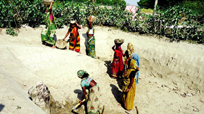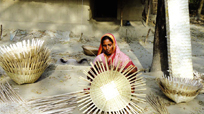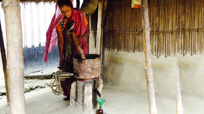| |
Formed in one and half years back, the Jonosheba community forum in Rayerbazar, Dhaka has gained respects in the locality for its role in advancing women causes and intervening in community sufferings. Recently the forum stopped an attempt of Fatwa of Hilla marriage.
Within its core programme BNPS develop a support base of local community leaders, youth and civil society members to take up and address women and community concerns. Community forums, a social platform of women group leaders and other local influential sympathizers, has been facilitated to establish an enabling environment for women in a collaborative manner. This is first time for many men and women who are jointly participating in a same platform, therefore indicative of a progressive change at the grassroots level. Preventing violence against women and mobilizing for improving local public services like health, public health, sanitary, livestock, public works, water supply are most common activities of community forums. Thus, these fora have been emerged as whistleblowers against violence against women as well as an interface mechanism between people and local government and administration in its working areas.
Jonosheba community forum is one of such platform located in Sultangonj area of Rayerbazar working area of BNPS Dhaka centre. The area is densely populated with lower income group people. This is relatively new working area of BNPS Dhaka centre. The community forum has been formed in mid 2012. Since then the forum members have gone through several learning sessions on women rights, legal issues, governance and advocacy and gradually became a trusted place for locale to resolve women’s causes in a lawful manner. Defending Jhuma, a young women in the community, from a violation by resisting the Hilla marriage fatwa would have been an inspiring achievement for the forum.
| |
|
|
| |
Hilla marriage can be translated in English to mean “interim” marriage. According to some ancient Islamic clerics, if a Muslim divorced couple want to resume their marriage, the now divorced woman requires to enter into a Hilla marriage with another man, have the marriage consummated, and then her new husband must divorce her. Only then can she remarry her former first husband.
However, forcing people to such marriages is punishable in Bangladeshi family law. According to legal and Islamic experts, the concept of Hilla marriage is considered, but not mandatory, only when a man tries to re-marry the same woman for the 4th time. The ordinance of 1961 was passed in order to stop the misuse of the Hilla marriage concept. Muslim Family Law does not prohibit a man from remarrying the same woman he has divorced, and vice versa. But Hilla marriage is still in force by fatwa of religious preachers and headmen of villages in many backward areas of the country. In those areas, local preachers have too much power and influence over everyone and get away with their wrong judgments and punishments. |
|
| |
|
|
| |
|
|
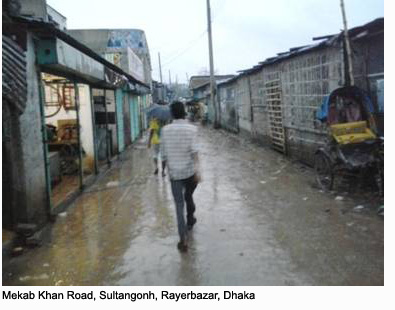 |
|
Jhuma Akter and Raju Hussain had an affair marriage. However, family members of Raju, did not accept Jhuma cordially and committed mental torture to Jhuma. They also pressurized Raju to not continue with his wife. Jhuma came to Janoseba community forum to complain against her husband and his family. After arbitration, community forum members settled the issue by a lawful divorce with ensuring the payment of unpaid amount of Tk. 30,000 of Mehr. But things were not over here.
|
| |
After a month of separation, the love revived in both the couple. Even Raju’s family’s attitude to Jhuma changed. They wanted to marry again. But petty religious leader of local mosque along with some relatives of Raju’s family posed a bar to this reconciliation in the name of Hilla marriage fatwa. Jhuma and Raju’s family again came to the community forum leaders, now for remarriage. Community forum members took the lead to arrange the wedding in local marriage registry office. |
| |
|
|
When talked to Mohammad Alam and Razia Sultana, the president and secretary of Jonosheba community forum, they explained how deficiency in proper legal knowledge cause harms to women and family life. “Earlier we led many arbitration where women might deprive of proper justice; but after becoming aware and knowledgeable on women’s legal rights we cannot allow such injustice to be happened anymore,” they said. “In Jhuma’s arbitration we tried our best to convince Raju repeal the divorce decision but failed. When he came up for remarriage we fixed a larger amount of Taka so that he should think before take such a step again in future”. Getting a divorce by husband whenever they want cannot be a trend, they added.
|
|
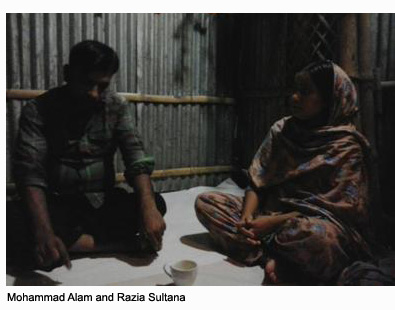 |
When asked on how they defied Hilla marriage they referred the articles of Muslim Family Ordinance 1961 that prohibits his malpractice. Also they mentioned the landmark rule of Bangladesh High Court in 2000 to forbid all kind of fatwa.
|
Right now four numbers of women groups and one cluster committee is active in Sultangonj working area under BNPS core programme on mobilizing women for promoting their rights. A significant number of women group members are paid domestic workers in affluent households. According to Razia Sultana’s observation, who also leads one of four women groups, the general notion that domestic violence is more prevalent in slum or lower income households is not true. Women in middle class families are severely oppressed in different forms. Women in slums with having their own income are outspoken against any maltreatment by their male counterparts. Even if any of them don’t, their neighbors share the same fence of rooms come up for intervene. On the other hand, women in middle class families have to bear the burn throughout their lives. Razia emphasizes to reach out middle class women through same kind of empowering activities. |
| |
|
|
| |
|
|
|
|
|



